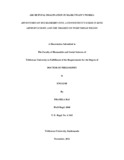Please use this identifier to cite or link to this item:
http://archive.nnl.gov.np:8080/handle/123456789/474| Title: | Archetypal imagination in Mark Twain’s Works: adventures of Huckleberry Finn, a connecticut Yankee in King Arthur's England, and Puddn’head Wilson |
| Authors: | Rai, Pramila |
| Keywords: | Mark Twain's Work Huck Finn Hank Morgan David Wilson Self-awareness |
| Issue Date: | 14-Jan-2018 |
| Abstract: | This dissertation titled “Archetypal Imagination in Mark Twain’s Works: Adventures of Huckleberry Finn, A Connecticut Yankee in King Arthur's England, and Puddn’head Wilson” is an approach to study Mark Twain’s novels from the archetypal perspective. The concept of psychological archetypes is derived from the studies made by Carl G. Jung, and the hero archetype by Joseph Campbell. In The Archetypes and the Collective Unconscious, Jung defines the archetype as universal and recurring image, pattern or motif representing typical human experiences which are the result of countless experiences of our ancestors and they are the psychic residue of numberless experiences of lived life from primordial times. Similarly, Joseph Campbell says that the heroes are essentially social constructions and they are not real. Every society has similar hero stories and they express a deep psychological aspect of human existence. They can be seen as metaphor for man's quest of self-knowledge. In other words, the hero shows the path to our own consciousness through his actions. Jung has called the process of forming a consciousness "individuation." Therefore, through individuation process man is able to reconcile the conscious/unconscious aspects of the psyche. In the process of the journey of life, the hero encounters many dangers. So, in myths when he kills a monster or defeats an enemy, he is not literally killing it in the real world, but facing the negative aspects of his unconscious, such as lust or rage, anger, hatred etc. to control that negative side of his being. Therefore, the hero stories are like road maps for the successful assimilation of the conscious, rational mind with the unconscious, animal mind. Such stories are both a record of primitive encounters with the unconscious as well as a prompt for individuals to enter into a struggle in order to attain higher consciousness. The quest theme in archetypal imagination implies an individual’s search for freedom to attain higher consciousness and enlightenment. Quest means a journey of search, or a pursuit of the unknown. The route that the hero must follow is dangerous, full of hurdles and his ultimate quest is the attainment of Truth. In the quest narrative the hero follows three distinct stages: departure, initiation and the return. Therefore, he is essentially alone in his quest and he makes his heroic undertaking, a celebratory journey of self realization and self discovery. Then the quest becomes a metaphor for the inward search of self discovery. This dissertation explores the journeys of Huck Finn, Hank Morgan and David Wilson to realize the Truth, or higher consciousness and enlightenment. It is divided into six chapters. The first chapter opens with an introduction to myth making process in Mark Twain's works. The second chapter deals with myth theories from primordial past to the present, and the model for the hero cycle is based on Carl Jung’s psychological archetypes in The Archetypes and the Collective Unconscious, and the cyclical hero patterns in Joseph Campbell’s The Hero with a Thousand Faces. It also provides the keys to hero cycle pattern, which the protagonists follow in their heroic quests. The third chapter is on Mark Twain’s mythic model in Huckleberry Finn, A Connecticut Yankee in King Arthur's Court and The Tragedy of Pudd'nhead Wilson. The fourth and fifth chapters are the textual analysis of the three books to trace the heroic quests of the protagonists. These heroes are not presented as classical heroes but they are representatives of modern men in the world. The final chapter ends with the tragedy and triumph of the common man because the heroic quest of the protagonist is the victory of the common man and this is the meaning of Mark Twain's triumph. The working of Mark Twain’s archetypal imagination in his novels presents a macro-cosmic world which accounts for a vast subject of human existence. The mythic theme of birth, death, and rebirth is like a thread of human lives from the primitive past through the cycle of changes to the modern crisis and the potentiality of the future. The stories of Huck Finn, Hank Morgan and David Wilson explore the tragedy of the common man and the common man's heroism is his concentrated self-awareness of humanity. |
| Description: | A Dissertation submitted to the Faculty of Humanities and Social Sciences of Tribhuvan University in fulfillment of the requirements for the Degree of Doctor of Philosophy in English, Kathmandu, 2014. |
| URI: | http://103.69.125.248:8080/xmlui/handle/123456789/474 |
| Appears in Collections: | 800 Literature & Rhetoric |
Files in This Item:
| File | Description | Size | Format | |
|---|---|---|---|---|
| PhD_Thesis_Pramila_Rai_Aug_2016.pdf | 1.37 MB | Adobe PDF |  View/Open |
Items in DSpace are protected by copyright, with all rights reserved, unless otherwise indicated.